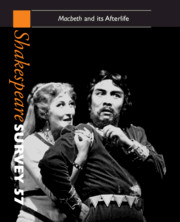Book contents
- Frontmatter
- Humane Statute and the Gentle Weal: Historical Reading and Historical Allegory
- Macbeth’s Knowledge
- ‘The Grace of Grace’ and Double-Talk in Macbeth
- Remind Me: How Many Children Had Lady Macbeth?
- Taking Macbeth out of Himself: Davenant, Garrick, Schiller and Verdi
- ‘Two truths are told’: Afterlives and Histories of Macbeths
- Doing All That Becomes a Man: The Reception and Afterlife of the Macbeth Actor, 1744–1889
- Macbeth and Kierkegaard
- Monsieur Macbeth: from Jarry to Ionesco
- The Politics of Sleepwalking: American Lady Macbeths
- Macbird! and Macbeth: Topicality and Imitation in Barbara Garson’s Satirical Pastiche
- Mick Jagger Macbeth
- ‘The Zulu Macbeth’: The Value of an ‘African Shakespeare’
- ‘A Drum, a Drum – Macbeth doth come’: When Birnam Wood moved to China
- The Banquet of Scotland (PA)
- Scoff power in Love’s Labour’s Lost and the Inns of Court: Language in Context
- Mercury, Boy Yet and the ‘Harsh’ Words of Love’s Labour’s Lost
- Shakespeare, Sir Thomas More and Asylum Seekers
- Hal as Self-Styled Redeemer: The Harrowing of Hell and Henry IV Part 1
- Mr Hamlet of Broadway
- Shakespeare Performances in England, 2003
- Professional Shakespeare Productions in the British Isles January–December 2002
- The Year's Contributions to Shakespearian Study 1 Critical Studies
- 2 Shakespeare in Performance
- 3 Editions and Textual Studies
- Books Received
- Index
‘The Grace of Grace’ and Double-Talk in Macbeth
Published online by Cambridge University Press: 28 March 2007
- Frontmatter
- Humane Statute and the Gentle Weal: Historical Reading and Historical Allegory
- Macbeth’s Knowledge
- ‘The Grace of Grace’ and Double-Talk in Macbeth
- Remind Me: How Many Children Had Lady Macbeth?
- Taking Macbeth out of Himself: Davenant, Garrick, Schiller and Verdi
- ‘Two truths are told’: Afterlives and Histories of Macbeths
- Doing All That Becomes a Man: The Reception and Afterlife of the Macbeth Actor, 1744–1889
- Macbeth and Kierkegaard
- Monsieur Macbeth: from Jarry to Ionesco
- The Politics of Sleepwalking: American Lady Macbeths
- Macbird! and Macbeth: Topicality and Imitation in Barbara Garson’s Satirical Pastiche
- Mick Jagger Macbeth
- ‘The Zulu Macbeth’: The Value of an ‘African Shakespeare’
- ‘A Drum, a Drum – Macbeth doth come’: When Birnam Wood moved to China
- The Banquet of Scotland (PA)
- Scoff power in Love’s Labour’s Lost and the Inns of Court: Language in Context
- Mercury, Boy Yet and the ‘Harsh’ Words of Love’s Labour’s Lost
- Shakespeare, Sir Thomas More and Asylum Seekers
- Hal as Self-Styled Redeemer: The Harrowing of Hell and Henry IV Part 1
- Mr Hamlet of Broadway
- Shakespeare Performances in England, 2003
- Professional Shakespeare Productions in the British Isles January–December 2002
- The Year's Contributions to Shakespearian Study 1 Critical Studies
- 2 Shakespeare in Performance
- 3 Editions and Textual Studies
- Books Received
- Index
Summary
Macbeth ends with a grisly flourish of the old king’s severed head and the new king’s invitation ‘to see us crowned at Scone’ (5.11.41). In its harshly literal juxtaposition of these two heads of state, the play’s climax presents a truncated tableau of the king’s two bodies. According to that ancient doctrine, the monarchy embodies the state and attains a kind of corporate immortality. Macbeth’s final scene thus vividly dramatizes the traditional proclamation, ‘The king is dead, long live the king’. In this paradoxical formula, continuity is assured from one reign to the next, even amidst the most brutal succession struggles. Still more reassuring is Malcolm’s promise to govern ‘by the grace of grace’ (5.10.38), a prayerful allusion to monarchy’s divine right and authority. Macbeth has been described as the consummate ‘royal play’ whose performance at court was intended to celebrate the reign of James I. Yet Shakespeare’s attitude towards monarchy here and elsewhere is ambiguous. Such ambiguity is typical of a playwright who, in Hamlet, places the claim that ‘There’s such divinity that doeth hedge a king / That treason can but peep to what it would’ (4.5.122–3) in the mouth of Claudius, a regicide and usurper. Macbeth presents even loftier visions of sacred kingship along with some of the ghastliest images of its violation. After murdering Duncan, Macbeth himself declares ‘Renown and grace is dead’ (2.3.93). By contrast, grace abounds at the English court of the sainted Edward the Confessor. There, Duncan’s eldest son, Malcolm, finds refuge and support since ‘sundry blessings hang about his throne / That speak him full of grace’ (4.3.159–60).
- Type
- Chapter
- Information
- Shakespeare SurveyAn Annual Survey of Shakespeare Studies and Production, pp. 27 - 37Publisher: Cambridge University PressPrint publication year: 2004
- 4
- Cited by

